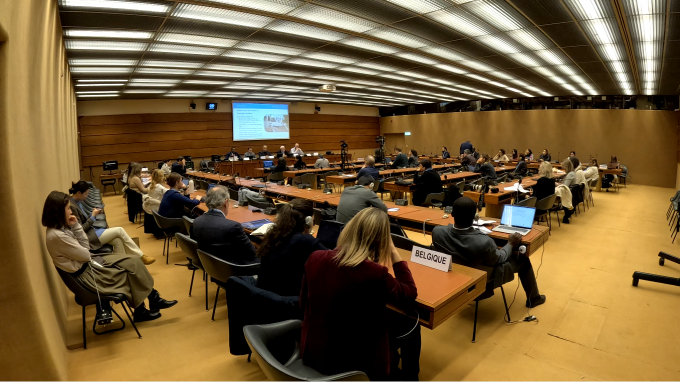On March 27, within the framework of the 58th Session of the United Nations Human Rights Council in Geneva, a side event titled "Children’s Rights in Conflict Zones" was held. The event was organized by the International Eurasia Press Fund with the support of the Agency for State Support to Non-Governmental Organizations of the Republic of Azerbaijan.
Participants included representatives of international organizations, government missions, foreign NGOs, scholars specializing in the subject matter, media professionals, and other distinguished guests.
The event commenced with an opening speech by Mr. Umud Mirzayev, President of the International Eurasia Press Fund. He addressed the plight of Azerbaijani children who were victims of deportation from Western Azerbaijan and those affected by the First and Second Karabakh Wars.
“With deep regret, I must note that as a result of ethnic cleansing in 1988–1989, more than 300,000 Azerbaijanis, including tens of thousands of children, were deported from their native lands within what is now the territory of Armenia. During the First Karabakh War, thousands of children were among those killed in the Nagorno-Karabakh region and the surrounding districts,” Mr. Mirzayev stated.
Subsequently, a short video titled "War and Children", which depicted the fate of children affected by conflicts in global hotspots — including Azerbaijani children — was screened. Following the video, Mr. Nick Nwolisa, Special Representative of the International Eurasia Press Fund, presented a report on children living in conflict zones. The report also included statistical data on landmine victims in Azerbaijan.
After the presentation, Mr. Nidal Salim — a board member of the “International Institute for Rights and Development” and Executive Director of the “Global Institute for Water, Environment, and Health” — spoke on the impact of ongoing conflicts on children’s lives. He addressed the cases of children who lost their lives in Karabakh and the current tragic developments in Gaza:
“In recent days, we have once again witnessed the escalation of conflict in Gaza. What troubles us most is the growing number of children among the casualties. We have seen similarly painful human stories in Karabakh. It is time to recognize that peace and security are not only vital for children but serve as the cornerstone for the protection of the rights of all people.”
Dr. Blerim Mustafa, a member of the Global South Network and a mentor at the Geneva School of Diplomacy, highlighted several critical statistics and specifically referenced the Khojaly tragedy.
“According to international research, 1 in every 6 children lives in regions affected by conflict. In the 1990s, approximately 10% of children resided in conflict zones — a figure that has nearly doubled today, reaching 19%. Children were among the victims who suffered the devastating consequences of both the First and Second Karabakh Wars. In particular, the Khojaly genocide has gone down in history as a horrifying massacre of children. It stands as one of the many grim realities faced by millions of children around the world,” he stated.
Dr. Simon Hills, Chief Technical Advisor at the International Labour Organization (ILO), spoke about the organization’s principles and actions:
“We are fully aware of the grave social challenges faced by individuals affected by war. Among the most egregious violations during such crises is the illegal employment of children — an issue we are actively combatting. Today, one of our core principles is to support peacebuilding through social dialogue, which we consider essential for restoring justice and stability.”
Due to technical reasons, pre-recorded speeches by Dr. Anna Lachowska, Head of the International Council of Persons with Disabilities, and Professor Kathleen Procter, a researcher at the Institute of International Relations, were delivered and received with great interest by the audience. Both addresses were grounded in thorough research and contributed significantly to the discourse.
Following the panel presentations, a Q&A session was held. During this segment, Ms. Melissa Parke, Executive Director of the International Campaign to Abolish Nuclear Weapons (ICAN), emphasized the importance of the event and expressed appreciation for the successful collaboration with the International Eurasia Press Fund (IEPF), thanking the organizers for their efforts.
The event concluded with the presentation of an official statement by the IEPF, addressed to international organizations and the global community, calling for the protection of the rights of children living in conflict zones and for broader support of peace initiatives. The statement also highlighted facts concerning Azerbaijani children who were deported from Armenia and those affected by the Karabakh wars.


